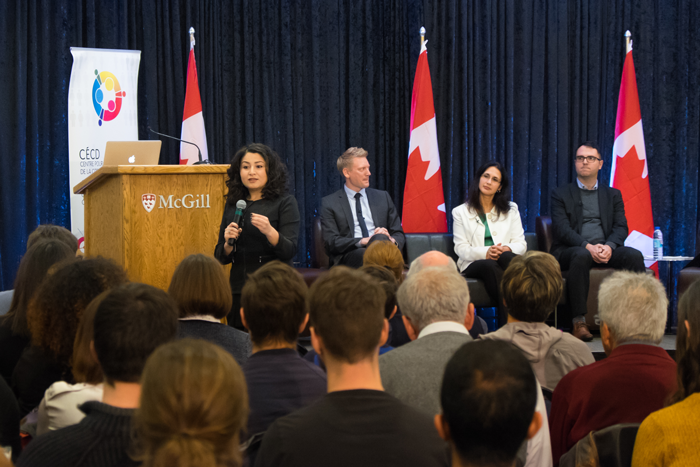On Oct. 20, the Centre for the Study of Democratic Citizenship (CSDC) held a forum on federal electoral reform at McGill's New Residence Hall with the goal of engaging the public in a discussion on possible alternative electoral systems for Canada. Four distinguished academics, Political Science Associate Professor Sven-Oliver Proksch from McGill, Peter Loewen from the University of Toronto, Marc André Bodet from Université Laval, and Laura Stephenson from the University of Western Ontario were invited to participate in the forum. Each panelist proposed an electoral system they thought was best for Canada and debated its merits. The systems discussed were two iterations of a proportional representation (PR) system, a ranked ballot system, and a defence of the current first-past-the-post (FPTP) system.
In a recent interview with Le Devoir, however, Prime Minister Trudeau has walked back on electoral reform promises. Although the forum was not run by the government, Canadian Minister for Democratic Institutions Maryam Monsef attended to promote the government’s commitment to electoral reform.
“My job as Minister for Democratic Institutions, I believe, is to restore the trust and confidence that Canadians have in their democratic institutions […] and ultimately [increase electoral] participation,” Monsef said.
The following debate mainly focused on whether citizens’ votes were well-represented in different formats of elections. Lowen argued that the current FPTP system allows citizens to vote out governments and smooth the transition of power, and, as such, wasn’t in need of an overhaul. On the other hand, Proksch and Stephenson argued that Canadians who vote for smaller parties are not well-represented and are forced to vote strategically for larger parties.
“Canada’s relatively small support for small parties […] is likely muted due to the strategic incentives of the existing system where voters are forced to pick a [large] party in order not to waste a vote in the election,” said Proksch.
Other issues tackled by the panelists included what it meant for a government to be representative and whether a PR system would empower fringe parties, such as the Green Party of Canada. In an electronic poll conducted at the end of the discussion, 50 per cent of the audience favoured the proposed mixed member proportional system presented by Proksch.
McGill student Priya Dube, U2 Arts, felt the debate was informative on the variety of electoral systems available for Canada.
“The fact that they're all academics, and the fact that they all went and researched their specific positions beforehand, really led to a more constructive debate,” Dube said. “There was less trying to denounce the other person’s views [and] more of trying to come to a solution.”
Ben Latour, U3 Arts, praised the panel’s level of expertise. All four panelists hold advanced degrees in political science.
“The overall frame was one of information and defending points of view,” Latour said. “They’re all academics […] they're all very informed about electoral and democratic institutions.”
Alex Smith, U2 Arts, expressed scepticism about the government’s public consultations and whether they would lead to change.
“[The government’s motive is] to look good, generally to look good, [so] we’ll see what happens,” Smith said. “There are pros and cons to every single system, so it’s a hard thing to deal with.”
Dube felt that the government’s commitment is genuine, but that the government would not have time to deliver electoral form by the next election.
“Right now [Trudeau is] doing the grunt work of really learning about what the country needs and wants—there’s clearly a lot of diverging opinions—so it shouldn't be something that’s rushed,” Dube said.










Contrary to above claims, party list systems and their MMP hybrids do not remove strategic voting for small party supporters: Swedish academic Annika Freden, among others, identify four main kinds of strategic voting. Strategic voting can only be minimised by making the proportional count be of a preference vote or ranked choice.
FPTP causes strategic voting, for less favored individual party candidates, to stop the least favored. Party lists and MMP hybrids are First Past the Post between parties, causing split voting between two possibly more popular parties. This continuing FPTP dysfunction is over-looked, because Lists and MMP hybrids are a spoils-sharing system of so-called party votes for seats. Party votes being one-choice illiterate x-votes hi-jacked by the parties to monopolise the proportional count. Yes, there are all the other groups in society that could benefit from genuine proportional representation, if it was the Single Transferable Vote.
MMP dual candidature makes it a doubly safe-seat system, denounced as undemocratic by the Welsh Richard report.
MMP allows single-member scooping parties to double claim on representation, from the second vote for a party list, with “fake” parties, like Forza Italia, Berlusconi’s stooge party.
Open lists were rumbled in the UK House of Commons when Home Secretary Merlyn Rees had to admit that an open list might still elect a candidate with no personal votes.
There is much more but suffice to say here that MMP is a supremely silly system, neither democratic nor scientific.
For the BC Citizens Assembly case for STV in brief, Google: ERRE>Meetings>Electoral Reform>Briefs) namely, BC Citizens Assembly on Electoral Reform (September 23).
Richard Lung.
Website: Democracy Science; links to 3 free e-books on election method: Peace-making Power-sharing; Scientific Method of Elections; Science is Ethics as Electics.